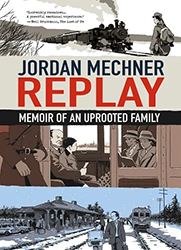In All the Answers, graphic novelist Michael Kupperman turns his talents to a serious subject, his relationship with his father, Joel Kupperman, who achieved a considerable measure of fame during World War II as part of the cast of Quiz Kids, a radio game show featuring a recurring group of child prodigies.
Joel Kupperman was one of the youngest of the bunch, and therefore had among the longest shelf lives of them all. A phenomenon who specialized in performing complex mathematical computations in his head, young Joel was celebrated from coast to coast.
His son’s book recounts the fascinating history of the program, whose creator, Louis G. Cowan (born Cohen), deliberately stacked the cast with Jewish kids to counter antisemitic propaganda emanating both from abroad and from within (most notably from the empire of Henry Ford). Kupperman also documents the surprising extent to which the series permeated American popular culture. Writers as varied as Philip Roth, Nora Ephron, and the team behind The Adventures of Rocky and Bullwinkle all found occasion to cite Joel Kupperman’s name in their works.
Not surprisingly, such fame came with a downside. Even in the early days, the national media hothouse was far from an idyllic environment, and the elder Kupperman, despite his brilliance, was plagued by unhappiness throughout his life.
Here the book becomes somewhat confounding. As unsurprising as Joel’s own unhappiness was, it is also no surprise that he wasn’t the warmest father. And for this, his son seems particularly unforgiving. He entertains fantasies of shaking his father out of the complacency that plagues him, but to no avail. His attempts to connect are not helped by the fact that as he steps up his efforts, the elder Kupperman is slipping into dementia, which the author, in an especially difficult moment, seems to interpret as an act of will, or at least a subconscious reaction to his experiences as a Quiz Kid.
The book never makes clear whether the author’s resentment of his father was ultimately resolved. In part, this is attributable to its form as a graphic memoir. The narrative is too sparse to allow the author to probe his multivalent subject matter with much depth. At several crucial points in the narrative, what actually happens is simply unclear; for example, when Joel makes a brief comeback on a rigged TV game show in the 1950s, does he take a dive when he realizes he’s part of a set-up, or go along with the ruse?
In the end it becomes difficult to square the all-too-human figure of Joel with the villain his son wants to portray him as being. True, he was emotionally absent at home, as many fathers were in the 1950s. But at the same time, this emotionally stunted “egghead” “had a long and distinguished career as a philosophy professor. He wrote, he traveled, he influenced thousands of young minds (presumably for the better). And while the author does conclude by asking whether his probing may have done more harm than good, many readers may find the issue far less problematic. All the Answers is an appealing, if baffling, book.





